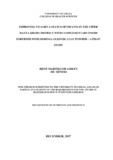UGSpace Repository
Improving Vitamin A Status of Infants in the Upper Manya Krobo District with Complementary Foods Fortified With Moringa Oleifera Leaf Powder – A Pilot Study
JavaScript is disabled for your browser. Some features of this site may not work without it.
| dc.contributor.author | Ashley, I.M. | |
| dc.date.accessioned | 2018-06-25T10:26:51Z | |
| dc.date.available | 2018-06-25T10:26:51Z | |
| dc.date.issued | 2017-12 | |
| dc.identifier.uri | http://ugspace.ug.edu.gh/handle/123456789/23503 | |
| dc.description | Thesis (MSc.) | en_US |
| dc.description.abstract | Background: Micronutrients are extremely important components of a high-quality diet and even though they are required in very small amounts, they are important in the building of healthy brains, bones and body. Micronutrient deficiency is a problem as its effects are irreversible. In Africa, vitamin A deficiency is reported to be the cause of about 6% of deaths of children under the age of 5 years, and a major public health issue in Ghana. Inadequate dietary intake of vitamin A-rich foods is a major cause of vitamin A deficiency, so one preventive strategy could be the promotion of the consumption of these foods. Moringa oleifera leave powder is rich in nutrients especially vitamin A. It is well accepted in infants and have proved successful in combatting malnutrition in infants. Therefore, there is a need to design a pilot study to test the efficacy of Moringa oleifera on serum retinol levels in infants. Aim: To test the efficacy of Moringa Leaf Powder (MLP) in improving the serum vitamin A level of children in the complementary feeding age using secondary data. Methods: A pilot study with three study arms was carved out. Infants were randomly assigned to receive one of the 3 study foods (CF-35g, MCL-35g and M-5gS) depending on the Child Welfare Centre (CWC) they were recruited from. One arm received a cereallegume blend fortified with MLP named MCL-35g, a second arm received Moringa oleifera leaf powder as a supplement to be sprinkled on infant’s usual foods (MS-5g) and a third arm received a cereal legume blend, without MLP (CF-35g) to serve as controls. The feeding intervention lasted for 6 weeks. Baseline data on infant and maternal characteristics, household characteristics, anthropometry, hemoglobin level and child morbidity occurrence, were collected. Serum vitamin A was the primary outcome measure and was determined at both baseline and endline using the icheck flouro device. Morbidity occurrence, dietary intake and adherence to study foods were secondary outcome measures. Data on dietary intake was taken at baseline and endline using a 2 day 24-hour recall. Adherence to study foods and morbidity occurrence were collected over the study duration. Results: A total of 103 infant-mother pairs where recruited for the study but a total of 65 completed the study. All the infants in the study were vitamin A deficient at both baseline and endline when compared to the WHO threshold of 0.70 μmol/l. There was no significant difference in serum vitamin A concentration within and among the control group and the two experimental groups at both baseline and endline. However, there was a marginal increase in serum vitamin A concentrations in all three groups at endline. There was a significant difference (p=0.026) in the iron intake of infants at baseline. There was also a significant difference (p<0.05) in adherence to study foods between those in the CF-35 g group and MCL-35 g group but no significant difference between the two experimental groups. Conclusion: Findings of this study showed that although there was a marginal increase in serum vitamin A concentrations for infants in all three groups, from baseline to end line, vitamin A levels of all infants were low when compared to the WHO threshold of 0.70μmol/l. This implies that, vitamin A deficiency (VAD) remains a major public health issue in the study population and in Ghana for that matter. As part of food diversification approaches to combat VAD, Moringa Oleifera leaf powder can be incorporated in complementary foods of infants in the developing world to improve their serum vitamin A levels and consequently their nutritional status. | en_US |
| dc.language.iso | en | en_US |
| dc.publisher | University Of Ghana | en_US |
| dc.subject | Vitamin A | en_US |
| dc.subject | Infants | en_US |
| dc.subject | Micronutrients | en_US |
| dc.subject | High-Quality Diet | en_US |
| dc.subject | Moringa Oleifera | en_US |
| dc.subject | Ghana | en_US |
| dc.title | Improving Vitamin A Status of Infants in the Upper Manya Krobo District with Complementary Foods Fortified With Moringa Oleifera Leaf Powder – A Pilot Study | en_US |
| dc.type | Thesis | en_US |
